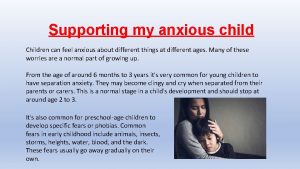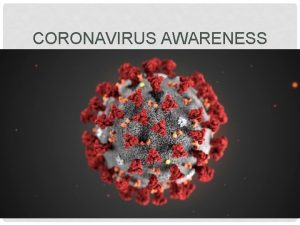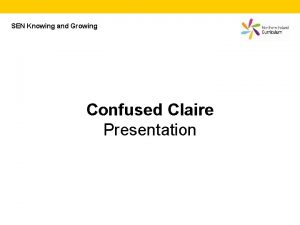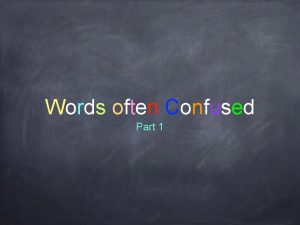Coronavirus in the News FEELING CONFUSED ANXIOUS NOT








- Slides: 8

Coronavirus in the News FEELING CONFUSED, ANXIOUS? NOT SURE WHAT IS REAL OR FAKE NEWS? LET’S TRY AND UNPICK THIS A BIT


We understand that this is quite a scary and anxious time for everyone and sometimes the news we are being bombarded with doesn't help. Here are top tips on how to manage your feelings and manage your understanding of fact Vs fake if you are experiencing any level of fear regarding Covid-19

Coronavirus and the news: How to protect your mental health and well-being Limit your intake of news - Limit the amount of time you spend reading or watching things which aren't making you feel better. Perhaps decide on a specific time to check in with the news Have breaks from social media and mute things which are triggering Mute key words which might be triggering on Instagram, Twitter, Tik. Tok and unfollow or mute accounts Mute Whats. App groups and hide Facebook posts and feeds if you find them too overwhelming Stay connected with people - Agree regular check-in times and feel connected to the people around you

Trusted websites for information on the Coronavirus https: //www. gov. uk/guidance/coronavirus-covid-19 -information-for-the-public The Government website giving most up to date figures, facts and guidance. To use the free GOV. UK Coronavirus Information Service on Whats. App, simply add 07860 064422 in your phone contacts and then message the word ‘hi’ in a Whats. App message to get started. https: //www. nhs. uk/conditions/coronavirus-covid-19/ The NHS website with the clearest advice on how to look after yourself and what to do and what not to do https: //www. bbc. co. uk/news/coronavirus The BBC website offers the most thorough news – national and global, guidance on coronavirus and advice on real and fake news

Manage your understanding of fact Vs fake Make sure the news you are reading is accurate - Use these websites to help you spot fake news: Useful guidance for all on Coronavirus and Fake News – myths, information going viral, stopping bad information https: //www. bbc. co. uk/news/topics/cjxv 13 v 27 dyt/fake-news KS 3 - https: //www. bbc. com/ownit/the-basics/spotting-fake-news? collection=know-yourstuff KS 4 - https: //www. bbc. co. uk/bitesize/articles/zjykkmn https: //fullfact. org/

If you decide to share, make sure to read stories properly and follow some checks to determine the accuracy. What to look out for Source. Question the source. References have been made to “Taiwanese experts” or “Japanese doctors” or “Stanford University” during the outbreak. Check on official websites if stories are repeated there. If a source is “a friend of a friend”, this is a rumour unless you also know the person directly. Logo: Check whether any organisation’s logo used in the message looks the same as on the official website. Bad English: Credible journalists and organisations are less likely to make repeated spelling and grammar mistakes. Also, anything written entirely in capital letters or containing a lot of exclamation marks should raise your suspicions. Pretend social media accounts: Some fake accounts mimic the real thing. For example, the unofficial Twitter handle @BBCNews. Tonight, which was made to look like the legitimate @BBCNews account, shared a fake story about the actor Daniel Radcliffe testing positive for coronavirus. Media platforms try to remove or flag fake accounts and stories as well as verify real ones. Look out for what their policies are to try to do this. Over-encouragement to share: Be wary if the message presses you to share – this is how viral messaging works. Use fact-checking websites: Websites such as APFact. Check and Full Fact highlight common fake news stories. You can also use a search engine to look up the title of the article to see if it has been identified as fake news by the mainstream media.

Manage your feelings Stay positive - Think about how many people are surviving the virus and all the amazing work being done by doctors, nurses, pharmacists, volunteers, carers, supermarket workers etc to help us Put things into perspective - There have always been viruses and doctors and scientists are always working to help us deal with the situation Get practical - Follow the advice given to us by the government and health professionals. Stay at home, wash your hands and keep to social distancing Switch off from the news so you don't become overwhelmed Be kind -Think about vulnerable people in our community like the elderly and ask your parents or carers to help you think of ways to show your support for them Look put for more support and ideas on managing these difficult times that will come your way in the next weeks Remember to look after yourselves and others!















